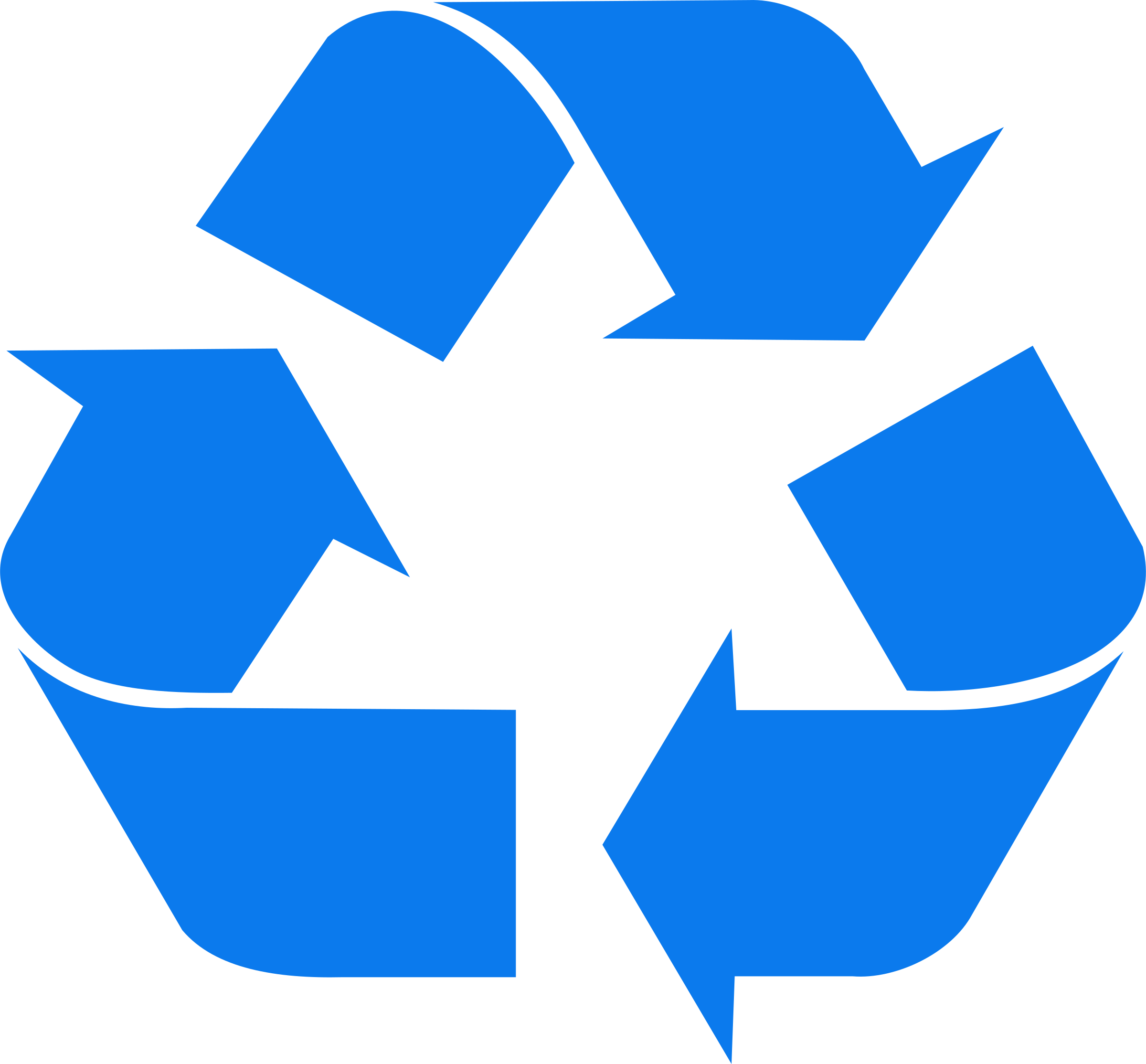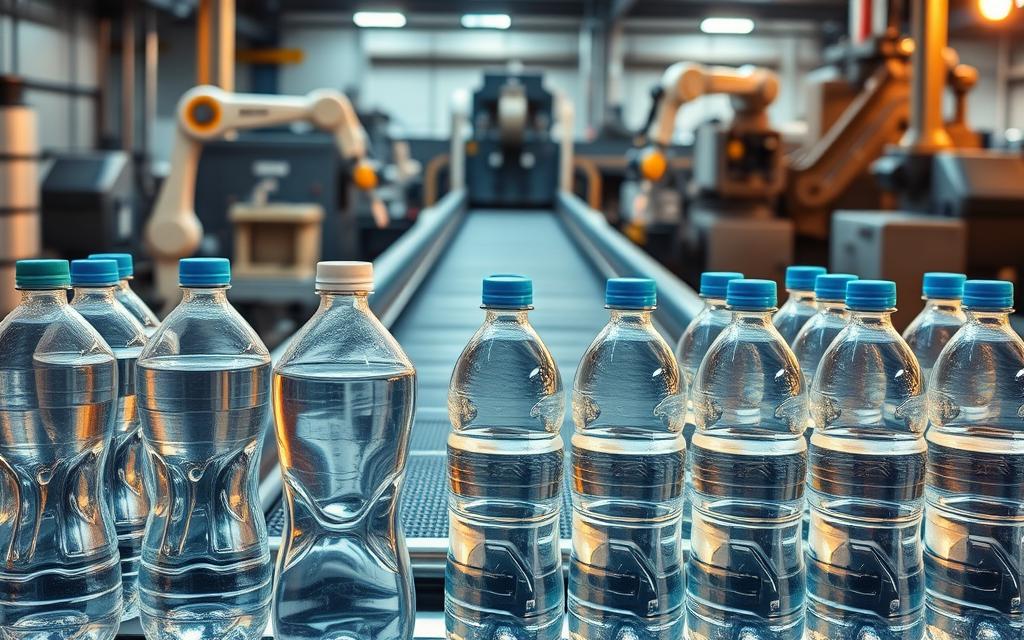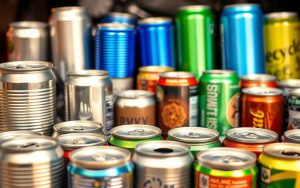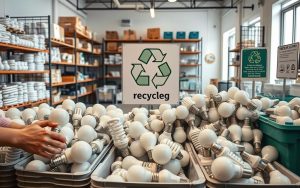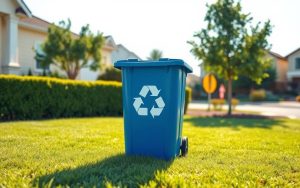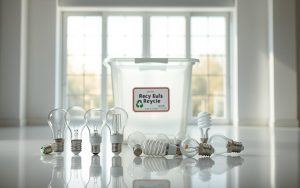Consumers are increasingly seeking sustainable hydration solutions. Brands like Klean Kanteen emphasize long-term durability, while others focus on circular design. The Good Housekeeping Institute collaborates with lab experts to address recycling complexities, ensuring clarity for eco-conscious buyers.
Programs like Hydro Flask’s Trade-In incentivize proper disposal, offering $5 credits for returned items. Their stainless steel composition ensures recyclability, setting a benchmark for other brands. However, materials like polycarbonate plastics pose challenges, as noted by expert Sabina Wizemann.
Research reveals 18% of lost items are never reclaimed, highlighting the urgency of responsible disposal. By understanding material limitations and leveraging brand initiatives, consumers can reduce their environmental footprint effectively.
Introduction to Recycling Reusable Water Bottles
Sustainable hydration has become a key focus for eco-conscious individuals. By choosing durable reusable water solutions, people significantly reduce their carbon footprint. Over three years, a single product can prevent more than 1,000 single-use plastic items from polluting oceans.
However, portability comes with trade-offs. Data from the UK shows these items are the most frequently lost on university campuses, with 98% never reclaimed. This highlights the need for better retention strategies.
Even the most durable products eventually face lifecycle challenges. Eco-conscious consumers often struggle with disposal alternatives, as landfills are not ideal. Understanding material-specific recycling pathways can help address this dilemma.
- Three years of use can save over 1,000 single-use plastic bottles.
- Portability leads to frequent loss, especially on campuses.
- Durable products still require end-of-life solutions.
- Ethical disposal options are limited for eco-friendly consumers.
In the following sections, we’ll explore how different materials impact recycling processes. This knowledge empowers consumers to make informed decisions about their reusable water products.
Can You Recycle Reusable Water Bottles?
Understanding the recyclability of hydration products involves examining multiple factors. The material used, local facility capabilities, and market demand for recycled goods all play a role. Not all items labeled as recyclable can be processed effectively in every area.
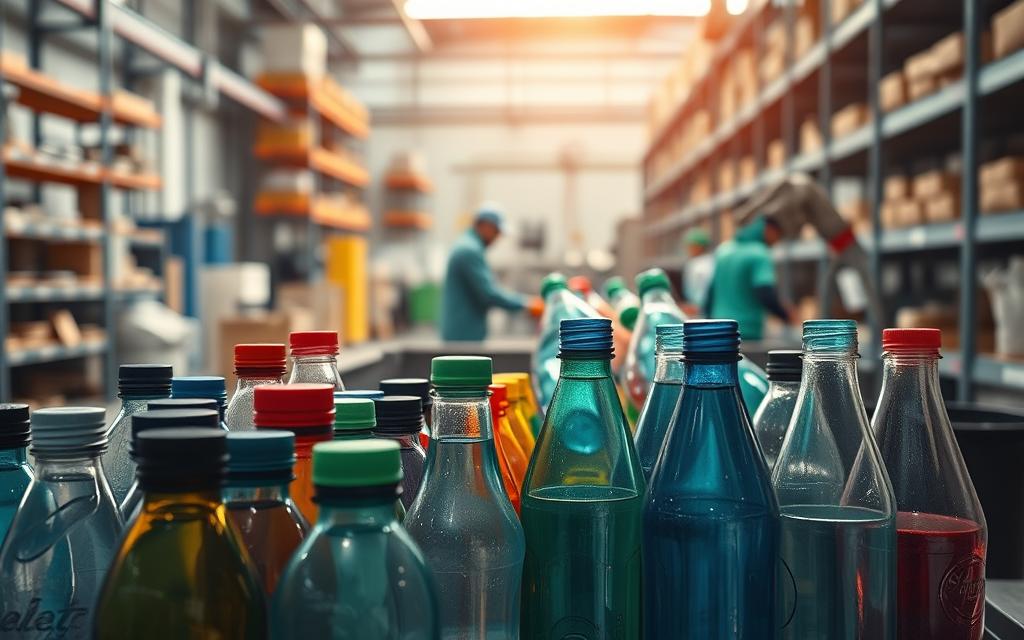
Factors Affecting Recyclability
Municipal infrastructure gaps often render some items non-viable locally. For example, while HDPE and LDPE plastics are widely accepted, polycarbonate and multi-layer composites pose significant challenges. These types plastic require specialized handling that many facilities cannot provide.
Identifying stainless steel versus aluminum is straightforward with a magnet test. However, heat-resistant glass often undergoes chemical treatments that complicate standard recycling. Additionally, separating lids and sleeves made from silicone or other non-core materials is crucial for effective processing.
- Local recycling capabilities vary, impacting the viability of certain materials.
- Widely accepted plastics like HDPE and LDPE contrast with problematic ones like polycarbonate.
- Chemical treatments in heat-resistant glass add complexity to standard recycling processes.
- Separating non-core components ensures smoother processing in the recycling bin.
By understanding these factors, consumers can make informed decisions about their hydration products. Proper disposal practices contribute to reducing environmental impact and supporting recycling efforts.
Materials Used in Reusable Water Bottles
The choice of materials in hydration products significantly impacts their environmental footprint. Different materials offer varying levels of sustainability and recyclability. Understanding these differences helps in making informed decisions.
Commonly Recycled Materials
Some materials are widely accepted in recycling programs. Stainless steel and aluminum are popular choices due to their durability and recyclability. Plastic types like HDPE and LDPE are also commonly recycled.
- Stainless steel: Requires specific recycling centers but is highly durable.
- Aluminum: Easily recyclable and often accepted curbside.
- HDPE and LDPE: Widely accepted plastics with flexible applications.
- Untreated glass: Recyclable unless chemically treated.
Less Commonly Recycled Materials
Some materials pose challenges in recycling. Tritan, a BPA-free type plastic, has limited recycling infrastructure. Bamboo, while biodegradable, can be complicated to recycle when bonded with resin.
- Tritan: BPA-free but not widely recyclable.
- Bamboo: Biodegradable but resin-bonded fibers complicate recycling.
- Silicone: Often not accepted in standard recycling programs.
| Resin Code | Material | Applications |
|---|---|---|
| #1 | PET | Single-use bottles |
| #2 | HDPE | Milk jugs, detergent bottles |
| #4 | LDPE | Plastic bags, squeeze bottles |
Understanding these materials and their recycling capabilities can help reduce environmental impact. For more detailed information, visit Good Housekeeping.
How to Recycle Reusable Water Bottles
Proper disposal of hydration products ensures minimal environmental impact. Knowing the right steps and local guidelines can make a significant difference. This section will guide you through the process of recycling your item effectively.
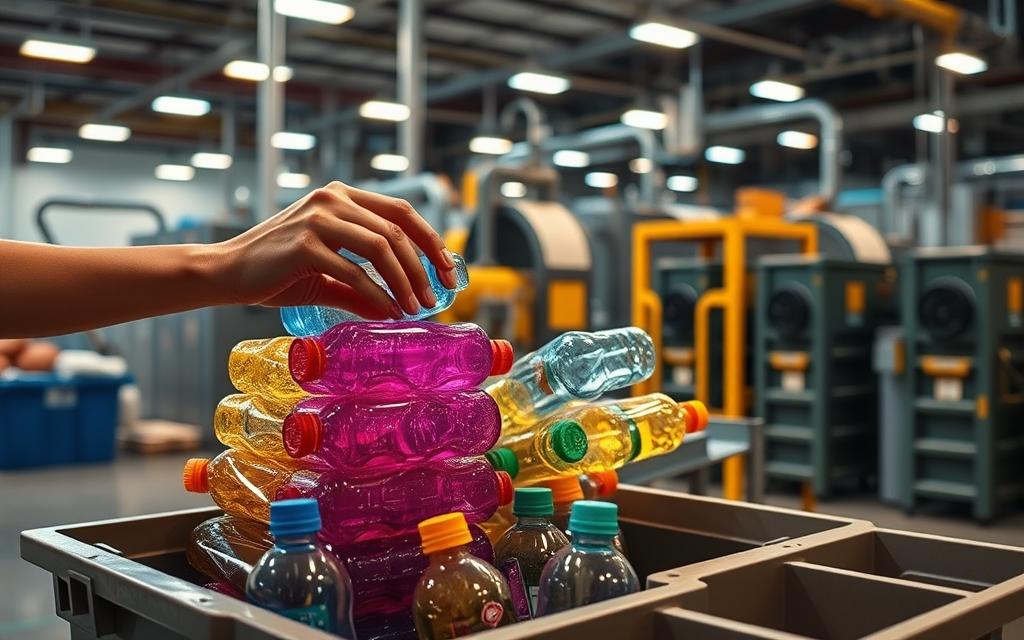
Check Local Recycling Programs
Recycling capabilities vary by location. Use tools like Earth911 in the U.S. or the Gov.uk postcode tool in the UK to verify acceptance policies. These resources help identify nearby centers that handle specific materials.
Some brands, like Hydro Flask, offer mail-in programs for their products. These initiatives ensure that your item is processed correctly, even if local facilities cannot handle it.
Prepare Your Bottle for Recycling
Before placing your item in the recycling bin, proper preparation is essential. Remove silicone sleeves and separate metal or plastic components. Thorough cleaning prevents contamination of the entire batch.
Non-recyclable parts can disrupt the process. Always check if your local facility accepts the materials used in your hydration product. For more detailed information, visit Good Housekeeping.
- Use local tools to verify recycling policies.
- Remove non-recyclable parts like silicone sleeves.
- Clean the item thoroughly before disposal.
- Support brands with take-back programs.
Creative Ways to Repurpose Reusable Water Bottles
Giving old hydration containers a new purpose can spark creativity and reduce waste. Instead of discarding them, consider transforming these items into functional tools for your home or outdoor adventures. This approach not only extends their lifespan but also contributes to a more sustainable lifestyle.
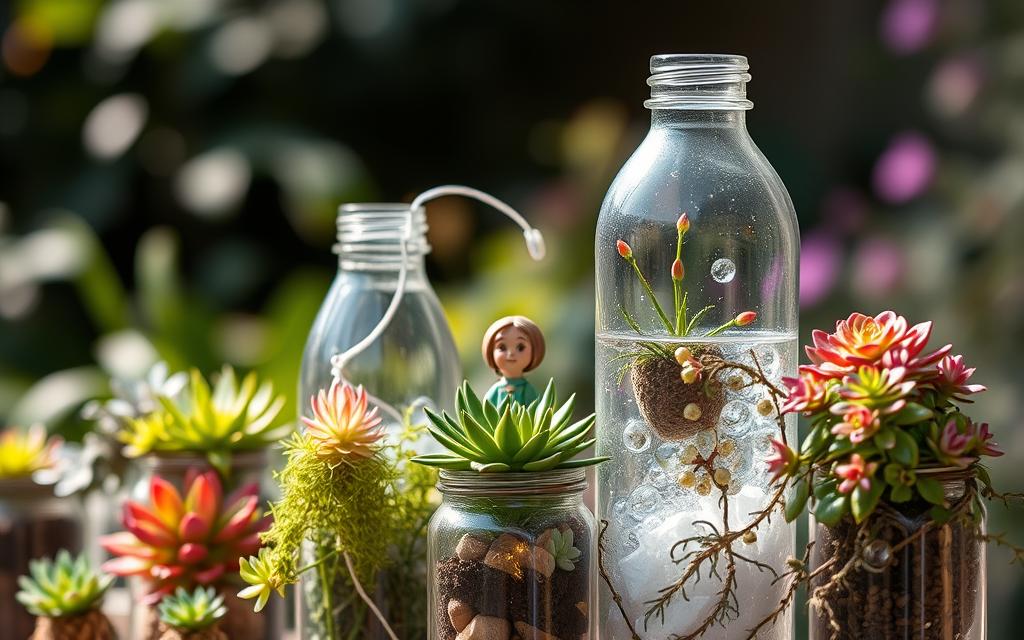
DIY Projects and Upcycling Ideas
Upcycling old hydration containers is both practical and fun. For example, wide-mouth designs can be converted into utensil holders or craft supply sorters. These items are perfect for organizing small spaces like kitchens or workstations.
Another creative idea is to turn them into planters. Drill drainage holes, add soil, and grow microgreens near a sunny window. This project is ideal for urban dwellers with limited gardening area.
- Transform them into airtight pantry organizers for rice or beans using chalkboard labels.
- Insulate outdoor showers by threading containers onto copper pipe stands.
- Create waterproof document tubes to protect phones or cash during watersports.
Brands like Hydro Flask suggest using their product as planters or storage solutions. Similarly, NotLost promotes repurposing them to conceal beach essentials. These ideas not only reduce waste but also add functionality to your daily life.
By exploring these creative solutions, you can give old hydration containers a second life. This approach aligns with sustainability goals and encourages mindful consumption over the years.
Conclusion
Making eco-friendly choices with hydration products starts with understanding material recyclability. Prioritize stainless steel and aluminum over complex composites for easier processing. Brands like Hydro Flask and Sistema® lead the way with scalable recycling programs, setting a standard for corporate responsibility.
Always consult local municipal guidelines before disposal to ensure proper handling. Individual actions, when combined, support circular economies and reduce the carbon footprint of waste. For stylish yet sustainable alternatives, consider W&P Porter Glass, which offers recyclable and durable options.
By choosing wisely and disposing responsibly, everyone can contribute to a healthier planet. Small steps today lead to significant environmental benefits tomorrow.
